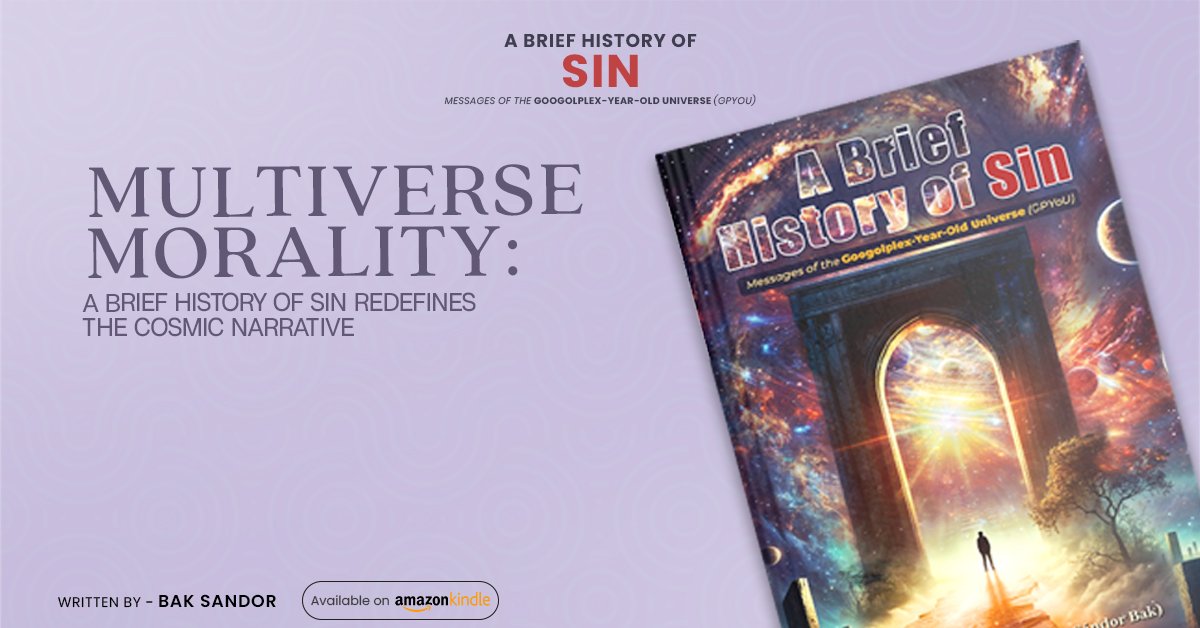Sin. A word long confined to religion, whispered in sermons or written into commandments. But what if sin isn’t just spiritual—it’s structural? What if it’s a flaw not in human nature, but in the design of consciousness itself?
In A Brief History of Sin, Dr. Sándor Bak (writing under the metaphysical pen name Alex Capricorn) offers a radical reinterpretation of morality—one that merges quantum mechanics with spiritual archetypes and philosophical inquiry. The result is a book unlike any other: a dazzling dive into multiversal ethics, collective purpose, and the mysterious intelligence behind it all.
Where the Physical Meets the Metaphysical
Capricorn doesn’t separate science and spirituality—he weaves them together. Drawing from fields like quantum theory, multiverse speculation, and consciousness studies, the author proposes a Metaplex Theory that transcends classical explanations of the universe.
According to this theory, everything we do—from acts of kindness to mistakes we regret—sends echoes through a vast interconnected field of realities. These aren’t just metaphors. They’re actual shifts in the multiverse’s structure. In Capricorn’s world, thoughts have mass. Guilt bends timelines. Forgiveness recalibrates entire layers of existence.
The Universe Has a Moral Algorithm
Central to Capricorn’s thesis is the idea that the universe isn’t morally neutral. It may, in fact, operate with a kind of embedded conscience—a cosmic algorithm that records not just motion, but meaning. Just as gravity pulls objects, there may be unseen forces pulling human decisions toward balance, justice, or correction.
This idea is expressed through the fictional yet deeply thought-provoking concept of the Constitution of the Multiverse. It isn’t written in any language. But its effects are felt every time we experience consequence, intuition, or coincidence too profound to ignore.
The book dares to ask: Are we participants in a moral universe, not just observers of a physical one?
Time Is Not What You Think
Capricorn also takes on the nature of time—and demolishes our linear understanding of it. Drawing on quantum entanglement and theoretical cosmology, he posits that time is layered, recursive, and capable of being influenced from both directions.
In this framework, sin is not a past action. It is an energetic imprint that vibrates through dimensions. Redemption, then, is not just a religious idea—it’s a physics of restoration.
A Universe That Watches Back
One of the most compelling threads in the book is the idea that our universe was “observed into being.” That it exists because it is perceived—not just by us, but by a higher observer still. This flips traditional cosmology on its head: we are not merely the result of the Big Bang; we may be the reason for it.
And with this comes immense responsibility. If observation creates reality, then how we look at each other, judge each other, love or betray each other—matters not just emotionally, but existentially.
Not Just a Book, but a Reckoning
- A Brief History of Sin* is not an easy read—but it is a necessary one. It challenges deeply rooted beliefs, invites contemplation far beyond the material world, and offers a completely original model for understanding right and wrong in a universe without edges.
For readers who admire thinkers like Alan Watts, Michio Kaku, or Eckhart Tolle, Capricorn offers something new: a voice that isn’t trying to resolve the universe’s paradoxes, but instead illuminate them.
Conclusion: What If Everything We Do Echoes Forever?
In a time when morality is debated in headlines and ethics is often outsourced to algorithms, A Brief History of Sin demands a return to inward reflection—only now, on a cosmic scale.
Alex Capricorn doesn’t preach. He questions. And in doing so, he gives readers the ultimate gift: permission to wonder again.
Wonder about their purpose. About their impact. About the grand design that just might be listening.
Amazon Link: A Brief History Of Sin


Leave feedback about this